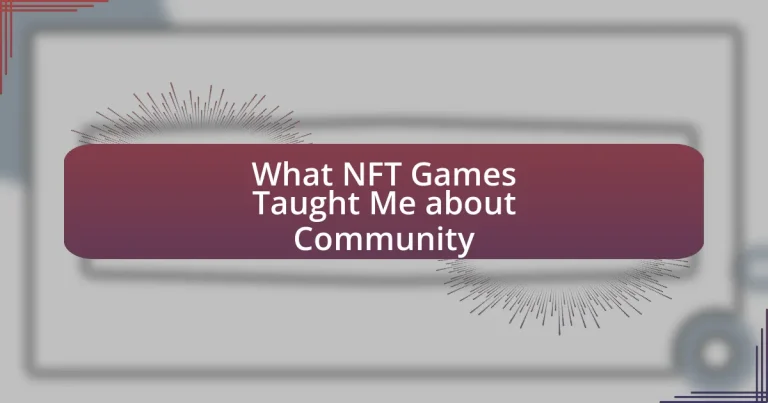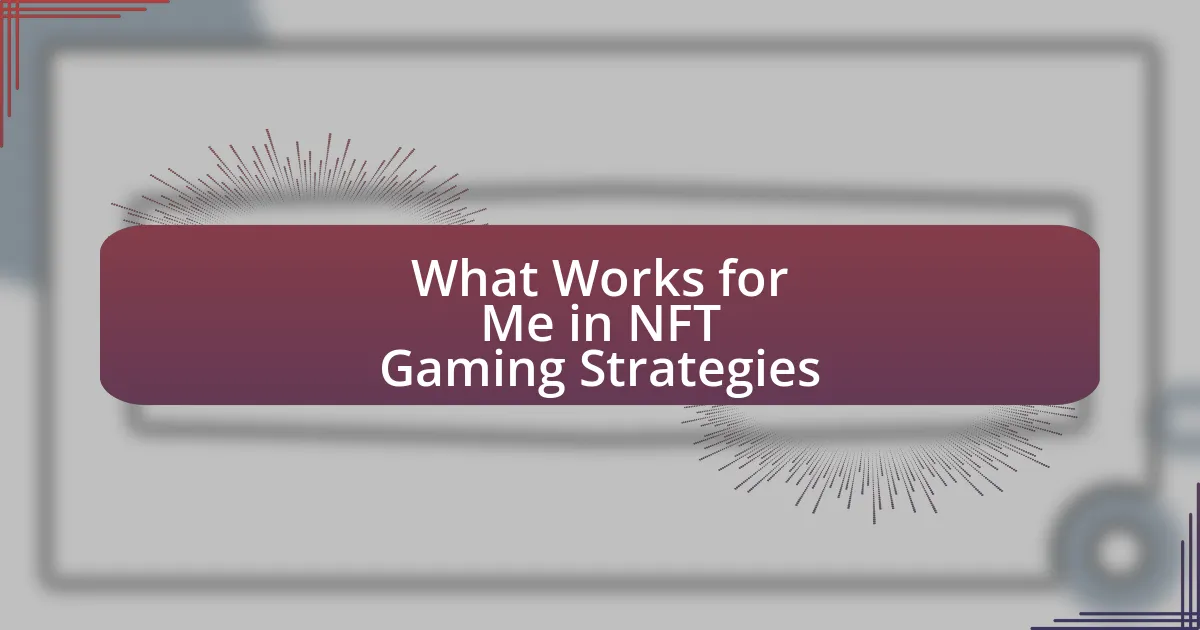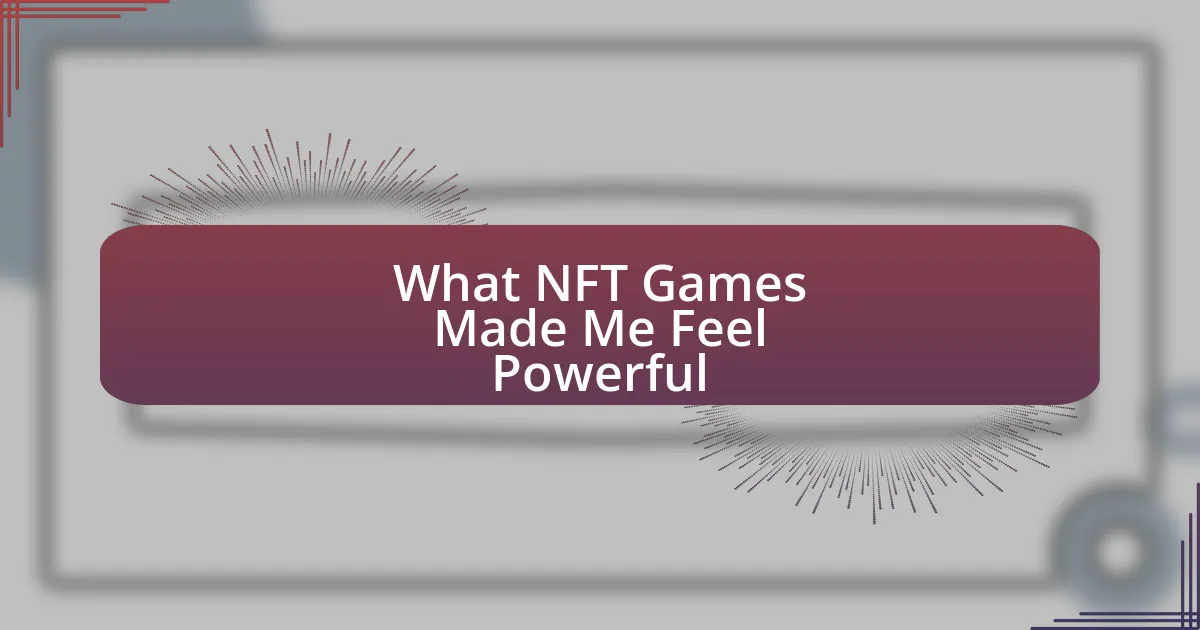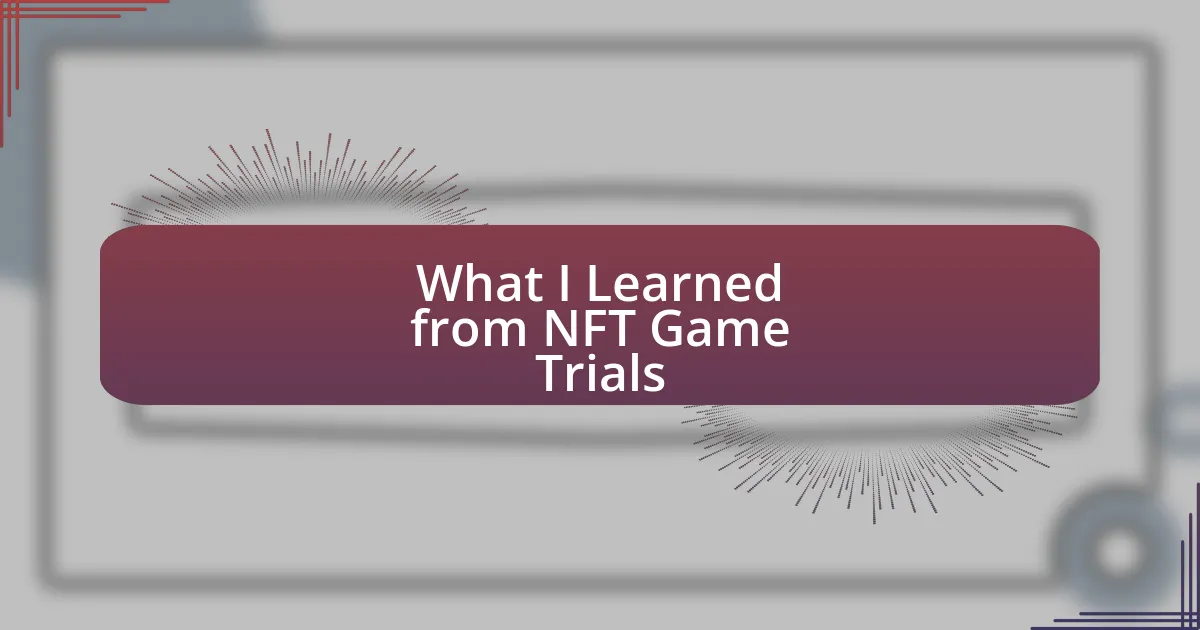Key takeaways:
- NFT games empower players with true ownership of unique in-game assets, enhancing the gaming experience through a play-to-earn model.
- Community is essential in NFT games, fostering collaboration, emotional bonds, and support, which enhances gameplay and creates lasting friendships.
- Building relationships within gaming can extend beyond the digital world, leading to real-life connections and a strong support network.
- Successful NFT gaming communities emphasize inclusivity, shared goals, and mentorship, facilitating growth and loyalty among players.
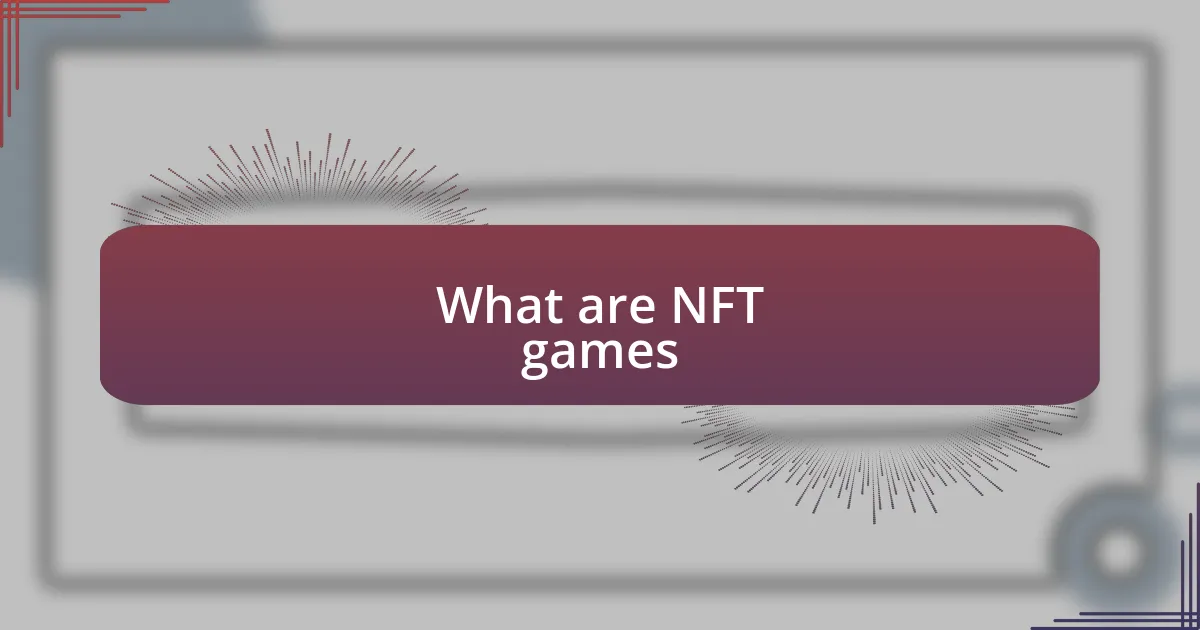
What are NFT games
NFT games, or non-fungible token games, are digital games that incorporate blockchain technology to create unique in-game assets that players can truly own. When I first encountered NFT games, I was fascinated by the idea that I could actually own a unique weapon or character, unlike traditional games where everything is essentially rented. Isn’t it exciting to think that the items you earn can have real-world value?
These games often feature a play-to-earn model, allowing players to earn cryptocurrency or NFTs by participating in the game. I remember the thrill of earning my first NFT after completing a challenging quest; I felt a sense of accomplishment and ownership unlike anything I had experienced before in gaming. Have you ever thought about how rewarding it is to have your gaming achievements recognized on a blockchain?
At their core, NFT games create vibrant ecosystems where community and collaboration are pivotal. As I engaged with other players, I realized that these connections transformed my gaming experience into a shared journey. It made me ponder—can virtual experiences foster genuine relationships, just as traditional games have done?
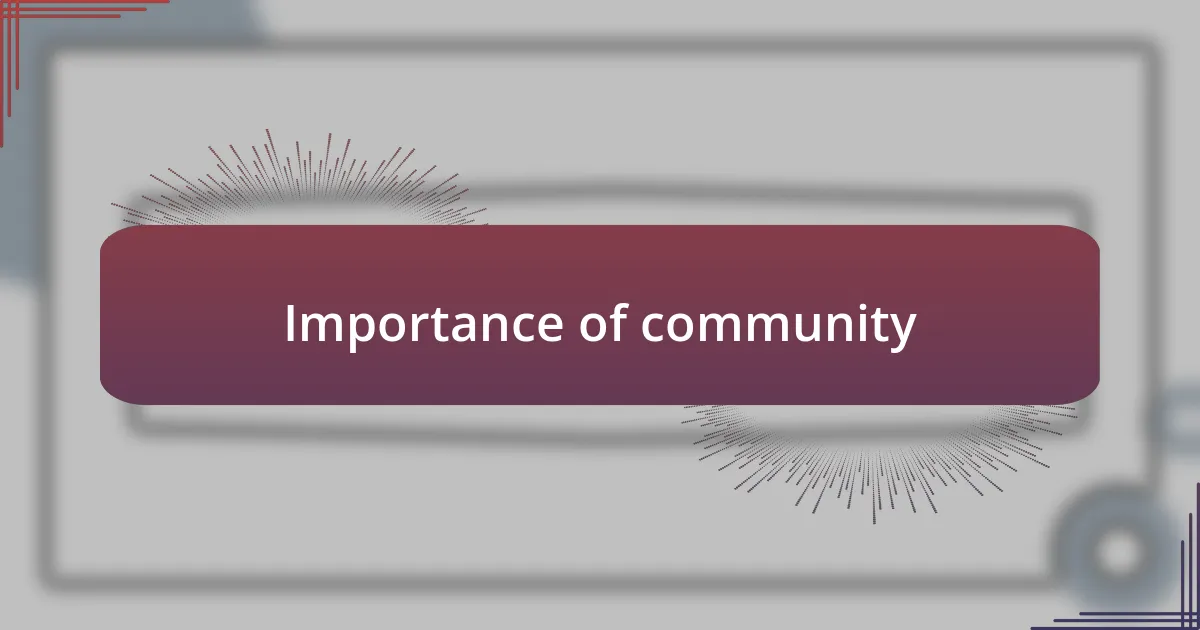
Importance of community
Community is the heartbeat of NFT games. It’s not just about competing for points or tokens; it’s about connecting with others who share the same passion. When I first joined a guild within an NFT game, it felt like stepping into a new world where every member’s contribution mattered. The camaraderie we built over shared strategies and late-night gaming sessions was incredible.
- Collaboration enhances gameplay.
- Shared knowledge fosters growth.
- Emotional support creates lasting friendships.
- Group challenges lead to unique experiences.
- A strong community drives game development and innovation.
I still recall the intense excitement we felt when we collectively tackled a formidable boss. It wasn’t just the victory that mattered; it was the laughter and shared stories that emerged from those moments. Within that community, my victories felt sweeter, and losses turned into valuable lessons, reinforcing the idea that we were in it together.
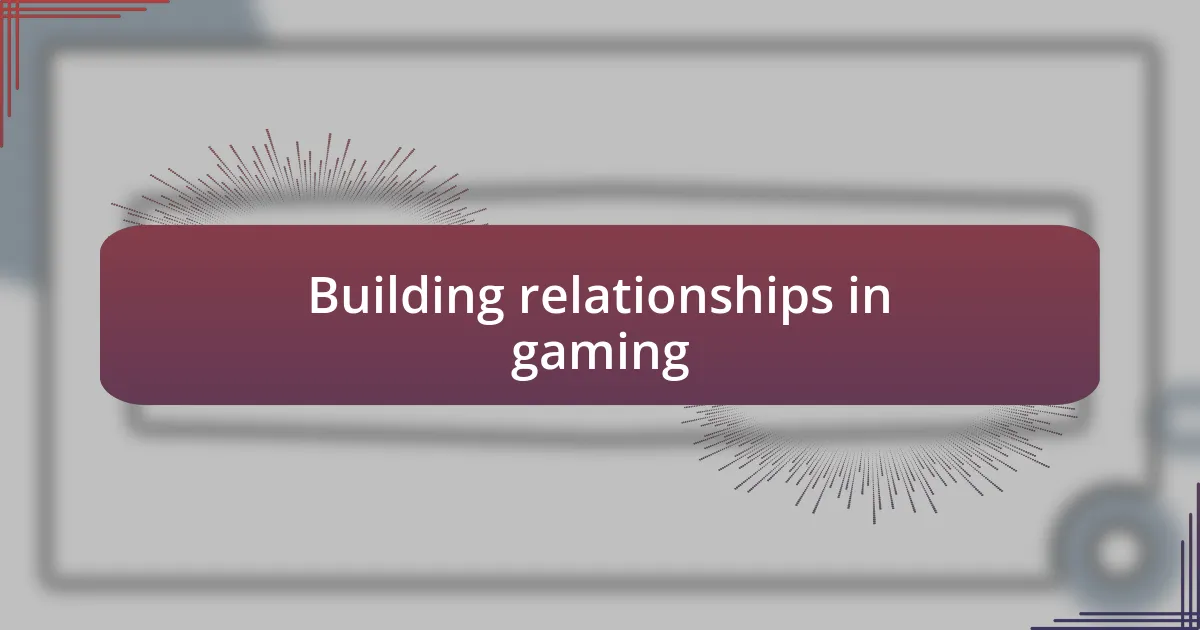
Building relationships in gaming
Building relationships in gaming goes beyond mere interaction; it’s about forging bonds that can last a lifetime. I still remember the first time I joined a team raid in an NFT game. The thrill wasn’t just in the gameplay itself but in the connections we made. That moment when we all synchronized our strategies to defeat a tough opponent? It felt like being part of a well-oiled machine, where each person’s role was crucial. Those shared adrenaline-pumping experiences formed a camaraderie that translated into friendships in real life.
As I progressed in the game, I noticed how relationships could evolve. Initially, we were just players sharing a virtual space, but we soon began celebrating birthdays and achievements outside the game. One memorable instance was when a teammate organized a surprise online birthday party for another member. It wasn’t just a zoom call; we played games, shared stories, and genuinely enjoyed each other’s company. This showed me that relationships in gaming can extend well beyond the digital universe, creating a support network that often feels more substantial than some real-life connections.
In my experience, these relationships can profoundly impact one’s gaming journey. I have learned that when you’re surrounded by a supportive community, even the toughest challenges become more manageable. Just last month, while facing a particularly difficult tournament, it was the encouraging words from my guildmates that motivated me to give it my all. These connections remind me that every player brings something unique to the table, enhancing our collective experiences and transforming the way we play.
| Aspect | Importance |
|---|---|
| Communication | Foster collaboration and strategy sharing. |
| Emotional Bonds | Create lasting friendships that extend beyond gaming. |
| Support Systems | Offer motivation and encouragement through challenges. |
| Shared Experiences | Transform gameplay into memorable moments. |
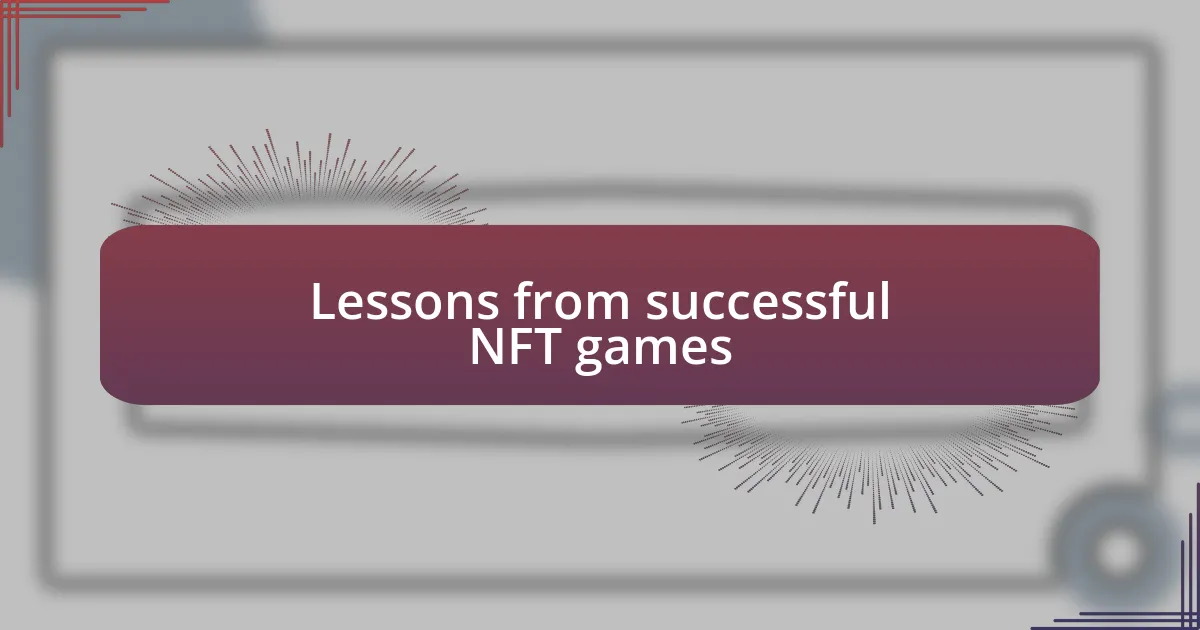
Lessons from successful NFT games
The excitement in successful NFT games often stems from their communities, which are like vibrant ecosystems. I recall a moment when our gaming group banded together to help a new player find their footing. The joy I felt watching them grow from a novice to a confident player was incredible. It made me realize that nurturing newcomers not only strengthens the community but also enhances the experience for every member.
Another lesson I’ve gleaned is the power of shared goals—think about those exhilarating NFT tournaments. One time, my team and I set a lofty objective of reaching the top 10 leaderboard. We planned, strategized, and practiced tirelessly. The unity and determination we developed during that period were unmatched. It highlighted how working towards a common purpose can solidify relationships, making the community feel more like a family rather than just a group of players.
Moreover, successful NFT games emphasize inclusivity, welcoming players from diverse backgrounds. I remember joining a guild where players spoke different languages and hailed from various countries. Initially, communication posed a challenge, but we learned to adapt, using a mix of visuals and gaming terminology. This experience taught me that embracing diversity not only enriches conversations but also opens up new perspectives, fostering a more vibrant community. How has your gaming experience been shaped by the diversity of your teammates?
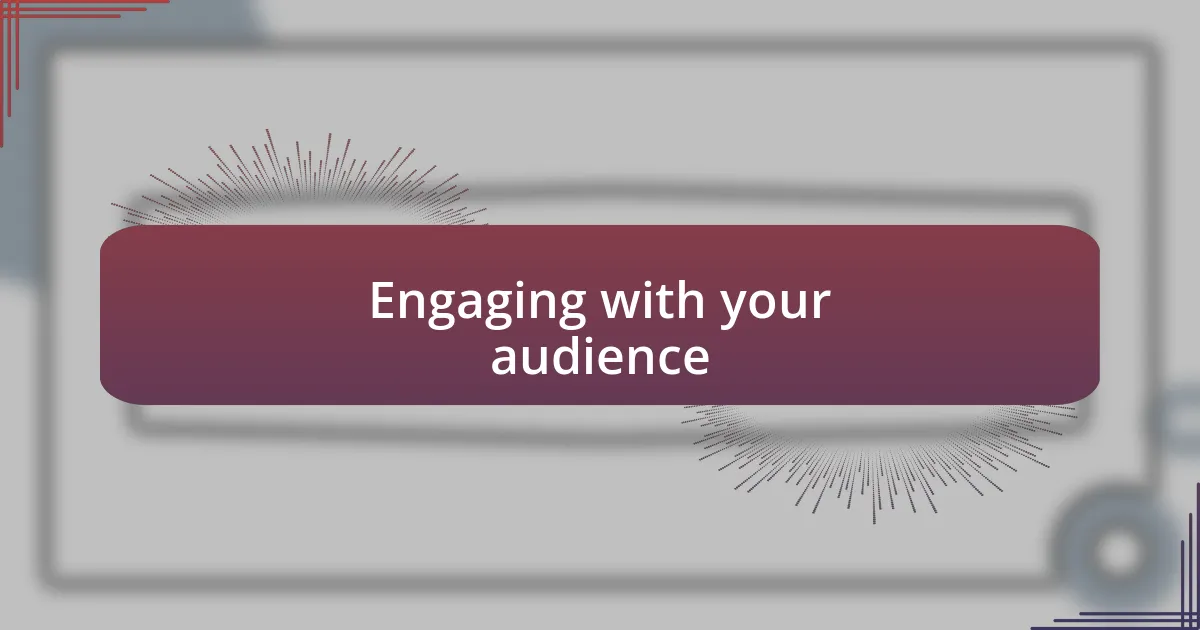
Engaging with your audience
Engaging with your audience starts with genuine interaction. I once led a discussion in my gaming guild about strategies for a challenging raid, and the insights shared by members sparked incredible ideas. It was fascinating to see how empowering others to speak up transformed our approach and elevated our collective experience, reminding me that everyone has something valuable to contribute.
I also learned that consistency matters. When I began hosting weekly community events, engagement soared. Players looked forward to these interactions, and it became a space to forge connections and share laughter. What surprised me most was how these regular encounters turned casual players into friends, reinforcing our bond over shared experiences—both wins and losses.
Another key aspect is to recognize and celebrate contributions. I recall organizing a small contest where players showcased their in-game art. The excitement was palpable, and it fostered a sense of ownership within the community. It made me wonder, how often do we take the time to acknowledge the creativity and effort of our peers? This practice not only strengthens ties but also amplifies the joy that comes from being a part of something special.
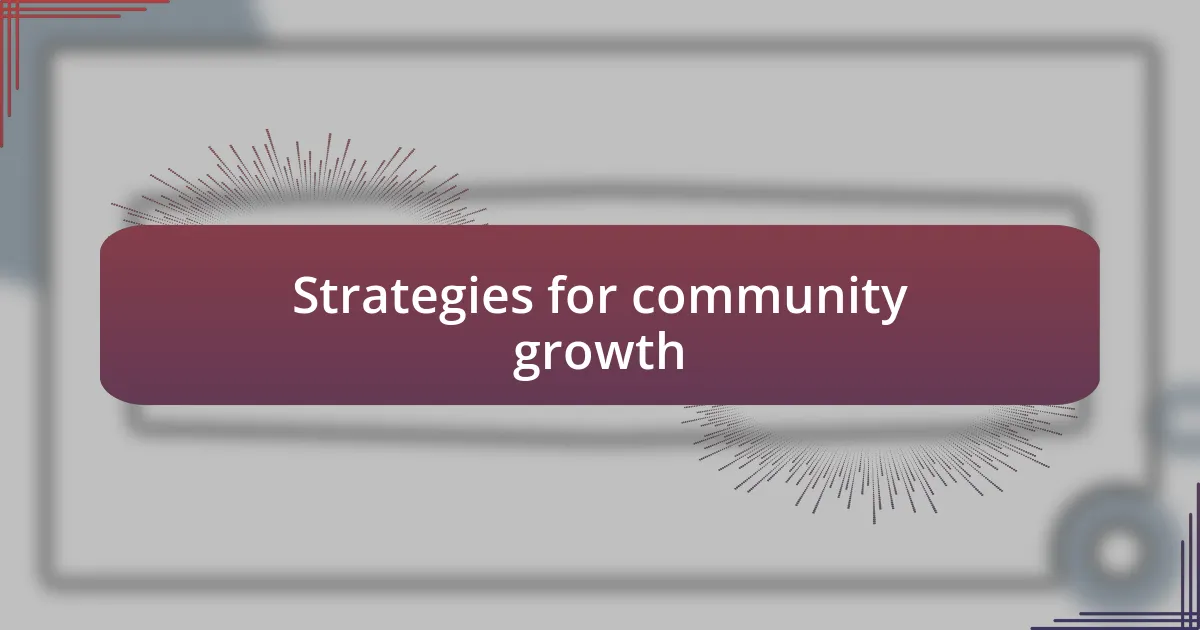
Strategies for community growth
Fostering community growth requires targeted initiatives that resonate. I remember when our gaming community launched a mentorship program, pairing experienced players with newcomers. The bonds formed through shared learning experiences were heartwarming, and it made me realize how kindness can encourage growth and loyalty—after all, who doesn’t appreciate a guiding hand when navigating new challenges?
Moreover, creating spaces for feedback is vital. I initiated a monthly feedback session, inviting members to share their thoughts and suggestions. Surprisingly, the level of trust this built was profound. Members felt heard and valued, leading to innovations that transformed our community dynamics. It’s interesting to consider: isn’t a community really just a collection of voices?
Another effective strategy is to leverage social media platforms for expanded outreach. When I started sharing our community stories on Twitter, I was amazed at the reactions and connections we forged beyond the game itself. Engaging with a broader audience not only attracted new members but instilled a sense of pride among existing ones. How often do we think about the stories we tell—could they be the key to bringing even more like-minded individuals into our fold?
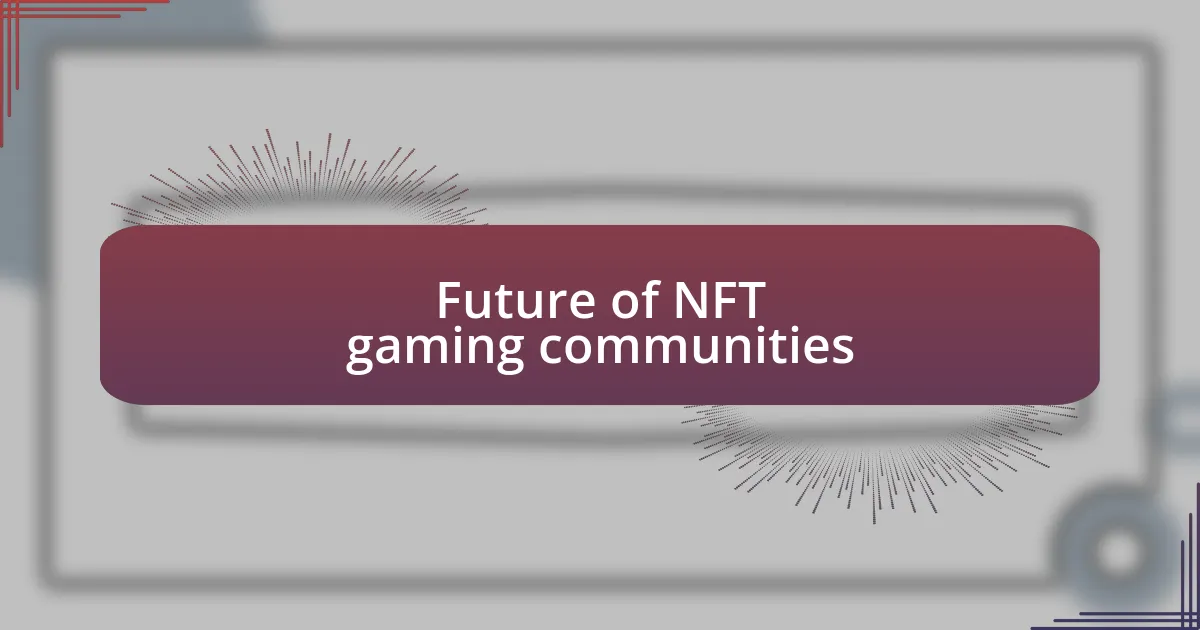
Future of NFT gaming communities
The future of NFT gaming communities looks promising, with a shift towards decentralization and player-driven governance on the horizon. I recall participating in a community vote that decided the game’s next feature, which fueled both excitement and ownership among players. It’s a game-changer—what if players could shape their worlds instead of merely existing within them?
Additionally, the fusion of social interaction and financial incentives may redefine how we engage. I’ve seen communities band together not just for gaming but to explore collective ownership of in-game assets. The question arises: how can shared economic interests lead to richer community experiences? I believe that as players invest in their communities, they’ll feel more accountable to one another, fostering deeper connections.
Looking ahead, I envision a world where NFT communities focus equally on inclusivity and diversity. I remember when our guild welcomed members from varied backgrounds, leading to richer discussions and fresh perspectives. Will this open-mindedness become the standard in gaming spaces? In my experience, embracing diverse viewpoints consistently leads to innovative ideas that can propel communities toward a vibrant and collaborative future.

